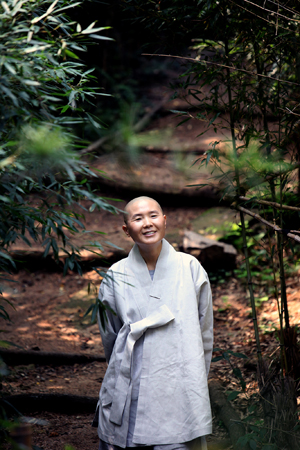 | ||
Ven Jung Mok Sunim, who is famous for her special title “The first bhikkhuni DJ” and an alumna of the Dongguk University class of 1980, has donated 20 million won to her alma mater. Additionally, she has been sharing her gifts with others who are in need by donating proceeds from her essays.
Q: What does contribution mean to you?A: I think contribution itself does not hold a special meaning. It is just a spontaneous action that follows when I have more than I need. I think that surplus profits are not supposed to remain in one person’s life forever. I believe I should give back to society. I am just a giver who passes what I am supposed to share with other members in our society. So for me, I give what initially belongs to society. I earned more money than I need for my basic life by writing essays and giving lectures. Also, I believe that people grow by their contribution. If you just try to hold on to your property, greed will grow in your mind as well. Thus, contributions are an effective training method to get rid of selfishness and greed in our minds. As you can see from real life, when people try to grab more things than they need, they are pushed to return it back to society in a number of ways. To explain this simply, let me give you an example. If you look at the life of bees, they gather honey from many flowers and store surplus honey in their hive. Because they stock up more than they need for living, they spontaneously lose honey to humans. To sum up, I think donations are committed when people throw away greed for personal profits and know the right time to share their surplus profits which were not originally ours. By sharing our things that are not primarily ours, all of us may grow together.
Q: What do you think of the special title given to you “The first bhikkhuni DJ”? And what is the most memorable episode as a radio DJ?
A: I think the title is interesting. It is because when you are given the title that defines yourself, it is hard to get out of that stereotype or the image that that title holds. In my case, “bhikkhuni” title offers a pure and virtuous image but at the same time it gives an impression to people that is hard to approach. However, by adding the “DJ”, it becomes more familiar. In other words, it is like a paradigm shift. In fact, I had the chance to be a classic music radio program DJ when the Buddhist Broadcasting System opened its first broadcasting station in Korea. It was definitely a new and challenging experience for me. I have so many episodes to share since my radio program was a live broadcast. One day, I was late for the radio program that is broadcasted live because of unexpected heavy traffic. I felt nervous and urgent since I thought I couldn’t fulfill my broadcasting duty. I got out of the car near the radio station and ran. Thankfully, when I arrived at the radio booth, the opening theme music was still playing so I quickly put on the headset and gave an opening comment to the listener. Now I recall the incident with a smile but looking back, it was one of the most impending moments in my life.
Q: How did the Seon Studies Major curriculum of the College of Buddhist Studies at Dongguk help you?
A: The curriculum at Dongguk University has offered me a chance to experience a whole new world and realize who I am. Among all of the many Dongguk University Buddhist Studies classes, I remember one class where I was able to learn the original Buddhist scripture, which is easier to understand since it provides the original writings of the Buddha.
Q: What virtues do you think students should possess to become talented people?
A: In our society, a talented person is regarded as someone with an outstanding ability but there is one virtue that many people tend to overlook. It is the ability to encourage other people. In human life, everything is made with cooperation and support. As the saying goes, no man is an island. Without any support no one can succeed. Thus, I believe the true meaning of a talented person is someone who can support others in need with one’s whole heart.
Q: Do you have any special meditations that you want to introduce to students?
A: People need meditation when they want to control their anger and are confused with all of their complicated thoughts. Usually, when people are in a bad mood they habitually think of negative images of them and do self-reproach. In order to get over this, we should think of at least one good deed that we have done. By discovering the good aspects of ourselves, we will be able to be change the negative atmosphere in our minds into a positive one.

